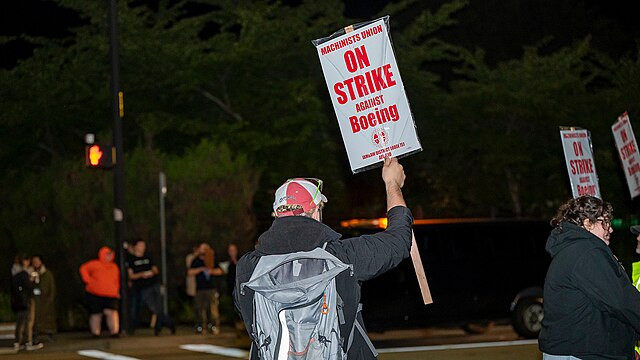Boeing's ongoing labor strike reached a new level of tension this week after the aerospace giant presented its "best and final" pay offer to the 33,000 striking workers represented by the International Association of Machinists and Aerospace Workers (IAM). The offer included a 30% wage increase over four years, along with additional retirement benefits and a performance bonus. However, the union swiftly rejected the proposal, stating it was not negotiated with union representatives and calling the company's tactics disrespectful.
In a statement posted on social media, the IAM criticized Boeing for bypassing its negotiating team by sending the offer directly to workers and the media. "This is a non-negotiated offer from Boeing," the union wrote, accusing the company of attempting to "drive a wedge" between its members and undermining the negotiation process. The union emphasized that Boeing's offer fell short of addressing key concerns raised by its members and therefore did not warrant a vote.
Jon Holden, president of IAM District 751 and the union's lead negotiator, expressed frustration with the timeline Boeing imposed, saying it was logistically impossible to organize a vote for 33,000 workers by the company's proposed deadline of September 27. "It missed the mark on many of the things our members said were important to them," Holden added.
Boeing, on the other hand, maintained that its latest offer addressed the concerns of both the union and its employees, and claimed that it had presented the details to the union before making them public. In a statement, the company said, "We have bargained in good faith and made significant improvements in this offer, which addresses demands from our workers."
The strike, which began on September 13, has caused significant disruptions to Boeing's operations, halting the production of some of its most profitable aircraft, including the 737 MAX. This has raised concerns about delayed deliveries for major customers like Ryanair, which is awaiting 30 737 MAX jets. Ryanair's CEO, Michael O'Leary, said Boeing had informed the airline that deliveries could be delayed by "the length of the strike plus two or three weeks." While O'Leary remained hopeful that all 30 planes would be delivered by June 2025 as planned, he admitted, "We're not sure that we necessarily believe that, but we have no choice but to work with Boeing once the strike is over."
Boeing's offer includes an improved ratification bonus of $6,000, along with reinstating a performance-based bonus and enhancing retirement benefits. However, the union remains unsatisfied, citing deeper concerns about job security and overall compensation. The workers had previously rejected an offer of a 25% pay increase, which they argued came with too many conditions attached. Workers also expressed frustration with the lack of progress on other issues, including pension benefits, which Boeing had eliminated for new hires in recent years.
The strike, which spans Boeing's facilities in Washington and Oregon, could significantly impact the company's production schedule. With around 96% of workers voting in favor of the strike, it reflects strong union solidarity and resistance to settling for less than their demands.
Boeing is under pressure to resolve the strike as it struggles to recover from recent challenges, including the aftermath of the 737 MAX crashes that killed 346 people and the subsequent safety issues that have damaged its reputation. New CEO Robert "Kelly" Ortberg is tasked with steering the company through these turbulent times while negotiating with a union that feels undervalued and underpaid.
The stakes are high for both sides. Boeing faces billions of dollars in lost revenue if the strike drags on, and further delays could affect its ability to meet delivery schedules for major clients like Ryanair. On the other hand, union members are losing pay with each day they remain on strike, although they appear determined to hold out for a better deal.
As the strike continues, Boeing's ability to restore operations quickly after a potential resolution remains uncertain. O'Leary indicated that even if the strike ends within the next few weeks, production delays could extend for an additional two to three weeks beyond the strike's conclusion.





